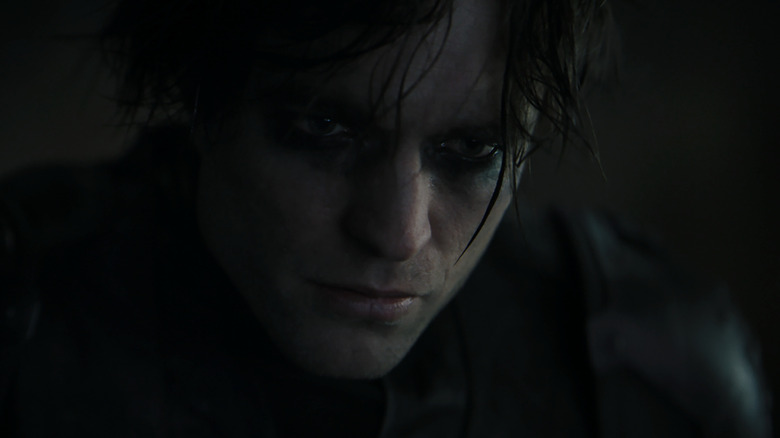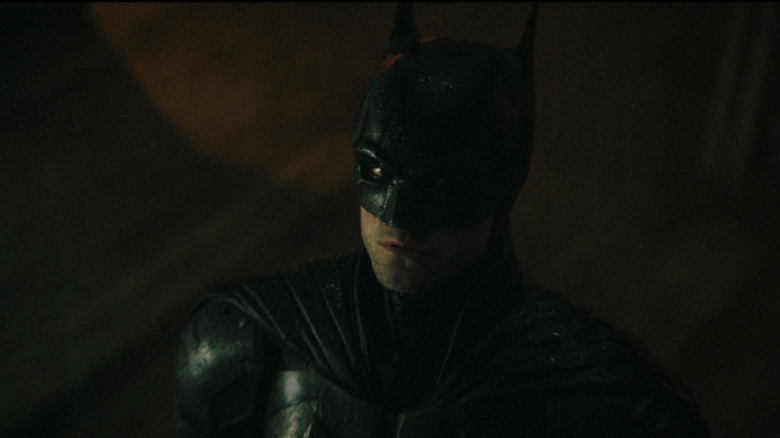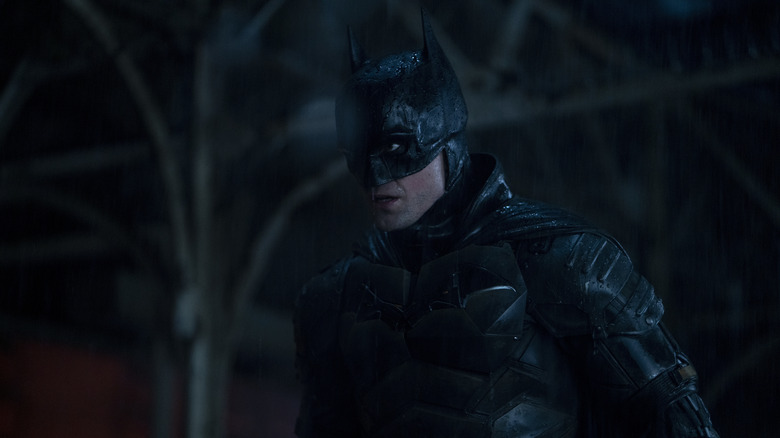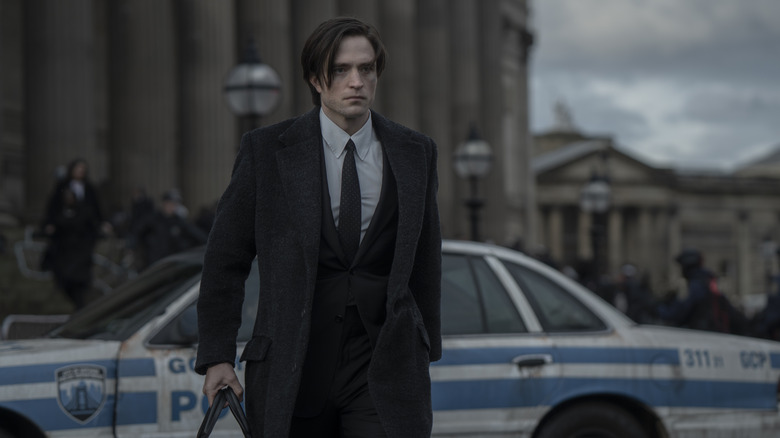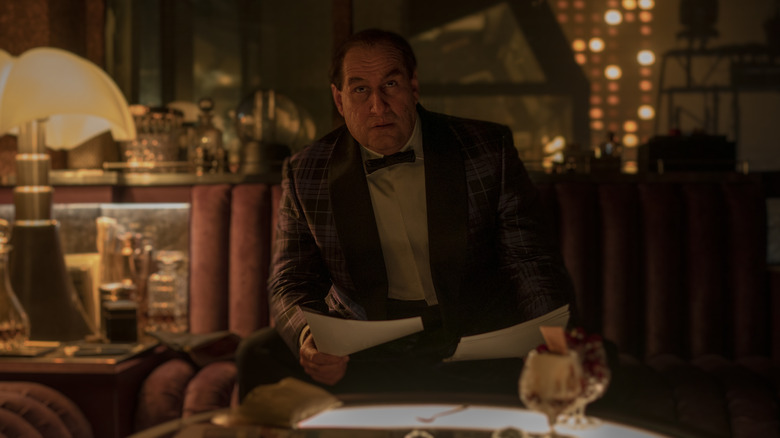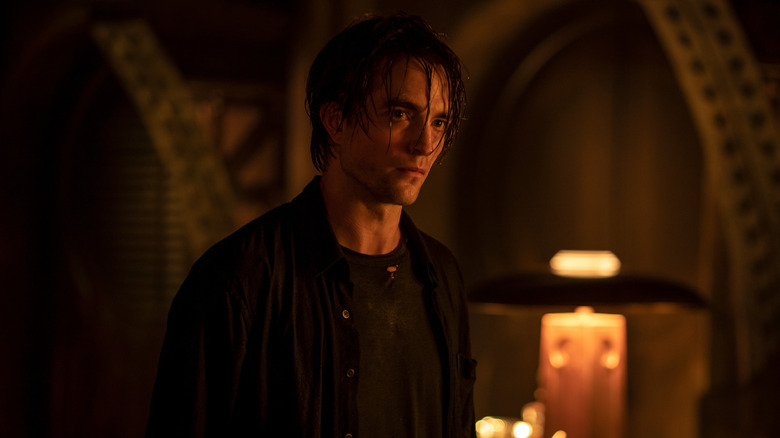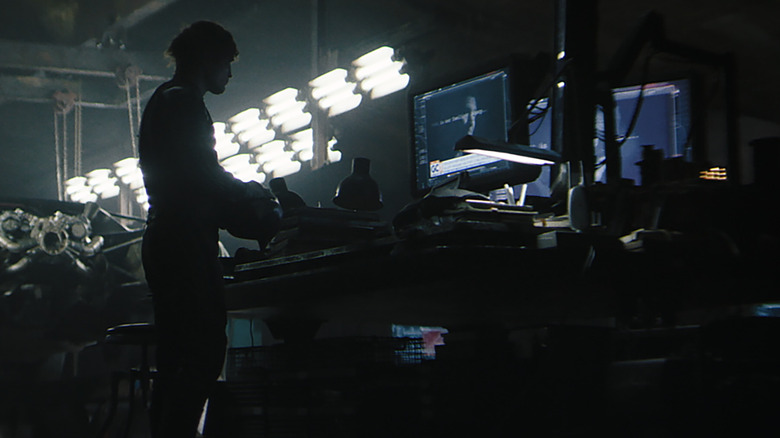Bruce Wayne's Darkest Moments In The Batman Ranked
If there's one thing the marketing for "The Batman" has made crystal clear, it's that this film is dark. More than perhaps any other live action adaptation of the Caped Crusader, Matt Reeves' film is one whose darkness, though present throughout the film and characterized by the stygian hellscape of Gotham City, is primarily concentrated within the core of its protagonist: Bruce Wayne.
Robert Pattinson embodies a depiction of Bruce, both inside and outside the cowl, that explores his conflicted motivations, unprocessed trauma and the ways that inner battle manifests itself in his ongoing war on crime. Through his intermittent voiceover narration, echoing the film's heavy noir influences, we get a deeper look into his character and psyche than ever before.
Having such a flawed detective leading a mystery this intricate makes for some stirring drama, but it also allows for some of the darkest moments the Dark Knight has ever experienced on screen. here's a ranking of how deeply these moments explore dark depths never before witnessed in the character.
6. Failure in progress
From the first moments we hear Bruce's inner monologue through his narration, we know this is an iteration of the character that is down in the dumps.
"Two years of nights have turned me into a nocturnal animal," he says. "They think I'm hiding in the shadows. But I am the shadows."
It's been two years since this Bruce's mission to fight crime in Gotham as The Batman has begun — and by his own admission, he's failing. Things have only gotten worse since he put on the mask and began spending his nights striking fear into the hearts of criminals. Even though the myth of The Batman and the looming threat of the violence he spreads has made rattled the criminal element, it has barely slowed their pace.
Bruce wants to change Gotham for the better, but knows deep down that what he is doing is not having its intended effect. Before he can fix his focus on the bigger picture and discover the true breadth of corruption and graft that has long strangled any potential for improvement in Gotham, he must trudge through this fruitless, repetitive cycle that is taking its toll.
5. "Please don't hurt me..."
The first time we see Batman in action, the audience gets a glimpse of what these brutal late nights have been like for Bruce. He encounters a gang of face-painted hoods, recreationally assaulting random people in the street and filming it for kicks. They're about to descend on their latest victim, a guy simply trying to make it home on the train, when they are confronted by Batman in full, cloaked regalia. This is that iconic "I'm vengeance" moment from the film's first teaser.
On some level, it's a thrilling action scene; on another, it's a discomforting example of Bruce's flawed approach to fixing his city. He dispenses with the gang members despite being outnumbered, but takes significant damage himself in the process. Shot at, tasered, kicked, punched, hit with weapons? No amount of billionaire armor and gadgetry is going to fully soften those blows. It's almost like he has a masochistic streak, believing he deserves such nightly beatdowns.
The ferocity it takes to overcome those odds and fight the gang showcases the sort of monster Bruce has become. The innocent bystander he set out to save is far from appreciative, cowering under the Batman's gaze in fear that he'll be next. The carnage on display makes it hard for him to comprehend that Bruce is a good guy.
4. "Are you a Wayne?"
By virtue of being the only living soul who knows Bruce's secret, Alfred (Andy Serkis) is burdened with the objectivity Bruce, in his quest to avenge his parents, is sorely lacking. Every night Bruce comes home to the cave and throws himself into maintaining his case files, diaries and ongoing investigations, it's Alfred (the closest thing Bruce has to a father) who has to perform the unfortunate task of pointing out the ineffective, unsustainable nature of his efforts. But, like many who love a person with self-destructive tendencies, he tries to be supportive while hoping to bring clarity to the situation.
Much like was the case with Christian Bale's Batman, it's Bruce's responses and reactions that make these early morning reality checks so depressing. We've already established through Bruce's own admission that he doesn't really care if he dies doing what he's doing. But when Alfred urges him to think of his family's legacy, as he continues to ignore managing his fortune or engaging with the company his father left him, Bruce remarks that his mission as The Batman is his family's legacy.
That alone would be a pretty dark declaration to make, but every time Alfred pushes him further, Bruce responds with callous and selfish thoughts to put Alfred in his place. When Alfred tries to be firm, Bruce reminds Alfred he's his butler and not his father. When Alfred won't let Bruce go to a funeral without cufflinks on, to keep up appearances, he makes Bruce wear his own, to which Bruce asks if Alfred himself is a Wayne. It's a question whose answer is meant to hurt Alfred for suggesting any connection to this lineage Bruce is too clouded by vengeance to even truly ponder.
Alfred explains to Bruce that it was his Thomas Wayne who gifted him the cufflinks, and that he was close enough to be family to the man Bruce is killing himself every night to avenge.
3. "You don't speak Spanish?"
"The Batman" is a movie that, more than any other Batman flick, showcases Bruce's intelligence and skill as a detective. But this being a story that takes place so early in his career, it also highlights how fallible he is. Those feet of clay lead to one of the film's most harrowing moments.
Midway through unraveling the film's central mystery behind who The Riddler (Paul Dano) is and what maze of moral rot he is trying to uncover in Gotham's history, Bruce and Lieutenant Gordon (Jeffrey Wright) believe they have figured out who "the rat" is. The latest riddle they've solved references an informant tethered to The Riddler's accusations that there's rampant corruption both in the Gotham City Police Department and the city's political power structure.
Bruce believes the riddle refers, in broken Spanish, to "a rat with wings," leading him to think it's The Penguin (Colin Farrell), the right hand man to mob boss Carmine Falcone (John Turturro). After an insane car chase, The Batman and Gordon tag team Penguin with their key accusation, going back and forth like a pair of cops in an interrogation, but Penguin insists he's not the rat. When they repeat the riddle, which includes the phrase "you are el rata alada" Penguin points out that it should be "la" since the noun in question is feminine.
Bruce realizes the bit the Riddler emphasized is "you are el" or "url" and types the rest of the phrase into a browser that leads to a chat window with the Riddler — in some ways, reminiscent of Michael Mann's "Blackhat." There he realizes Riddler's next victim is Bruce Wayne, and desperately tries to race home to save Alfred from the bomb that's been shipped there.
But he arrives too late. Alfred is hospitalized and in critical condition — all because Bruce misinterpreted a clue.
2. Sins of the father
As he probes more deeply into Gotham's history and sees how crooked its vaunted power structures have long been, he can accept that the shape of his enemy is more sprawling and vast than he initially surmised. But when the Riddler exposes the hidden history of Bruce Wayne's own family, it shakes him to his foundation.
In this iteration of the story, the Waynes were murdered not long after Thomas Wayne's bid for mayor of Gotham. The Riddler posits that the Waynes and the other founding family of the city, the Arkhams, had always exerted control over Gotham through their power and wealth, but in no case was this more pernicious than when a reporter was digging into their past during the campaign. A journalist uncovered that Martha, an Arkham before she married into the Waynes, suffered from severe mental illness in her youth and had a lengthy stay in the asylum of her namesake. Thomas, worried the scandal would impact his campaign, used his influence over Falcone, having once saved the man's life, to get him to silence the reporter — who was murdered.
Suddenly faced with the realization that his father wasn't the noble, altruistic victim he has committed himself to avenging, Bruce is sent into a tailspin, calling into question everything he's ever known. Although he later discovers that what he's been told by the Riddler and Falcone isn't exactly the whole story, such revelations still rock him to the very core of his being.
1. Two sides of the same coin
When the Riddler is revealed to be forensic accountant Edward Nashton and put behind bars, Batman comes face to face with him, only to discover some disturbing wrinkles to their adversarial relationship. Firstly, Bruce discovers Nashton knows who he really is. He arrives to their little tete-a-tete thinking his days of anonymity are over and that Nashton is going to reveal his identity, but what he finds out is far worse.
Nashton goes on a lengthy rant about how he always resented the sympathy the city had for the poor little rich boy who lost his parents, but not Nashton or the other orphans suffering in the dilapidated orphanage whose funding had been pillaged by greedy bureaucrats. But beneath this screed about his motivations is the revelation that his master plan is even larger than his string of killings.
Nashton has strategically planted bombs around the city to cause a flood, forcing many Gotham survivors to shelter in place at the arena where Mayor Elect Bella Reál (Jayme Lawson) will be giving her acceptance speech. Since Riddler's exploits have spent the last few days inspiring a certain element within Gotham, Nashton has developed a fervent online community who plan to don their own copycat versions of his unofficial uniform with the intention of wreaking further havoc and assassinating Reál.
Initially, this is an echo of an earlier moment when Bruce couldn't figure out one of the Riddler's clues, and he is now behind the eight ball again when it comes to halting this master plan. But then he understands why Nashton was so eager to meet with him; Riddler views himself as a kindred spirit, the same kind of necessary vigilante as Batman. He sees the two of them, together, as partners, as he's made Bruce an unwilling participant in his machinations.
This is reinforced later, when Batman tries to stop the Riddler acolytes and ends up needing to be saved by Selena (Zoë Kravitz) from the sycophantic, internet-fueled mob. When he's down and beaten and can't get up, he injects himself with some kind of adrenaline shot (perhaps, some suspect, the same "Venom" drug that Bane uses to increase his strength) to return the favor and protect her from the last remaining gunman — but it sends him into overdrive, as he brutally beats the man, nearly killing him before Gordon and Selina Kyle put a stop to it.
The man, near death, responds to the question "who are you?" with the most haunting answer in the entire film. "I'm vengeance," he replies, echoing Batman's very own words.
As rock-bottom as this moment might be for Bruce — coming face to face with the cracked mirror image of his unchecked rage manifested through the Riddler's plot — it's a necessary wake-up call. For as dark as "The Batman" is, it's a story that must plumb those depths to come out the other side transformed, a Bruce Wayne who understands that Gotham needs more than fear and violence to be saved from itself.
It needs hope. And so does Bruce Wayne.
